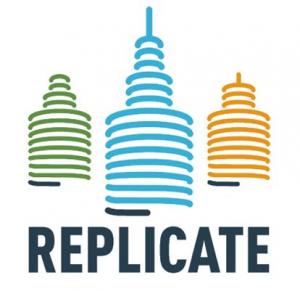
Details
Description
The REPLICATE project generated smart city business models, and tailor-made solutions in the areas of energy, transport and ICT. There were pilot actions in energy efficiency, efficient and sustainable transport and integrated infrastructures.
The key to the project’s approach was in recognising the inherent complexity of urban challenges and the distinctiveness of individual cities. It advocated innovative approaches to citizenship, with the aim of involving citizens as stakeholders at all stages of its activities to help co-create appropriate solutions and services which celebrate and work successfully with the characteristics and context of each individual metropolitan area in each lighthouse and follower cities.
The lead and follower cities were of similar sizes but reflected different geographical contexts. Over 36% of European cities have between 100,000-500,000 inhabitants. San Sebastián (Spain), Florence (Italy) and Bristol (United Kingdom) as lead cities, and Essen (Germany), Lausanne (Switzerland) and Nilüfer (Turkey) as the follower cities, offer a good distribution of population between 180,000 to 550,000 around this highly representative range. The REPLICATE project demonstrated how these cities can successfully reproduce effective smart services by identifying their strengths and working closely with citizens to ensure the appropriateness of solutions and maximising uptake.
Map
Project demonstration sites
REPLICATE Site Bristol
City
REPLICATE Site San Sebastian
City
REPLICATE Site Florence
City
Results
REPLICATE City-To-City Learning Sessions 2019
The City to City Learning programme was launched in 2019 and consisted of 6 webinars. The aim of this webinar series was to promote the experience sharing among the cities and so the replication activities.
https://replicate-project.eu/city-to-city-learning-sessions-2019/
Best practice: Smart City Platform in Florence
Replicate has implemented a smart city platform in Florence, which collects data, performs data analysis, aggregation, and storage. It allows public or private users to access data easily via a dashboard and an application. The solution is based on the Snap4City (https://www.snap4city.org), a fully open source, license-free platform. The platform provides a real time data management, performing data processing analytics, and offers a set of dashboards for the Florence municipality Control Room. The Control Room dashboards provide views of:
- Mobility and transport
- Key performance indicators of several governmental services
- Civil protection alerts
Impact and results:
-
Snap4City improves city services, security, and safety by offering a sustainable solution for smart cities and the Living Lab, attracting industries and stakeholders.
-
Snap4City is a capable tool keeping under control real-time city evolution by reading sensors, controlling key performance indicators, detecting unexpected events, performing analytics, and taking actions on strategies and alarms.
-
It facilitates better targeting of government support and universal access to services, tailoring services for the community and citizen participation.
-
The early solution produced for Replicate has been strongly improved with many new activities which allow to use the derived solution in other cities or organizations.
Objective
The main objective of the REPLICATE project was to develop smart city business models in the lighthouse cities and validate them against citizens needs so that they are sustainable and replicable beyond public funding.
Related topics
Building aspects
- Building Energy Services
- heating and DHW
- Installed Renewable Energy Sources
- solar thermal collectors
- Technology used to supply the buildings
- boiler
- Technology used to supply the buildings
- district heating (DH) network
- Technology used to supply the buildings
- thermal storage
Energy Carriers
- Domestic gas - grid-bound
Energy Systems Types
- Infrastructure & System Integration
- DHC extension
Mobility Type of Intervention
- Infrastructure
- Vehicles
Thematic Field
- Information and Communication Technologies
- Mobility and Transport
- Refurbished Building(s)
